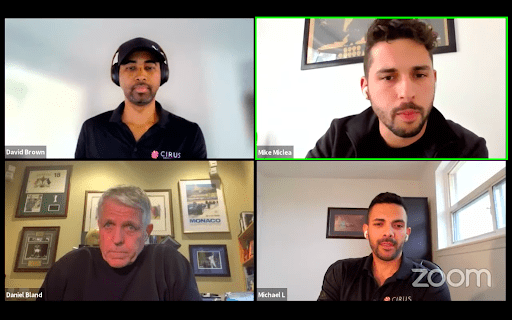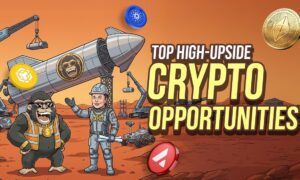Blockchain community leaders have recently got a chance to speak with the Cirus Leadership team – CEO and Co-Founder Daniel Bland, Co-Founder Michael Luckhoo, and Head of Research and Community David Brown through a virtual AMA. Below are key insights from the session and answers from the team regarding the Cirus Foundation recent traction and developments.
*The answers have been edited for clarity.
Quickfire updates from the Cirus team include details on the Cirus rollout in India with D-VoiS that will drive adoption, and the Cirus contribution pool, through which a part of funds staked on the platform will be used to build out the Cirus network infrastructure and generate value at the protocol and network layers, delivering resilience and performance to the applications that are then built on top of them.
Can you tell us a little more about the project’s progress in India?
Daniel Bland: Absolutely. India is part of our emerging market strategy, and we are focused on delivering a great experience to our partner D-VoiS and their clients. We have identified eight or nine other regions in which we can hopefully expand our footprint thanks to our ISP-contracts approach.
What payment options will be available for obtaining a Cirus router and will the routers be per person or per household?
Michael Luckhoo: We want to make our service accessible for everybody and minimize friction as much as possible, so payments via Cirus tokens will work on the platform, and we will work on a mix of crypto and fiat-based on the user’s jurisdiction so that everyone gets in. Regarding the number of routers, the Cirus router will work just like a router in your home, so it is one per household, not one per user. Each router can have multiple SSIDs for different users that will allow us to profile each individual within a given household. From a single Cirus router, we can obtain correlated data that we will use to create a profile that maps how each individual in the house creates data and how they connect. You can think of the router as an access point for the whole family – one that creates data assets for each individual. This way, each individual will be able to generate their own earnings based on their data and online activity.
Thank you for that. Back to Daniel. Some of our viewers have questions about user experience and onboarding. What are your focus areas? How will people access the platform and start earning?
Daniel Bland: Great questions. With regards to accessing a router, you can join the platform with your router and start earning revenue for your data. It costs nothing to join, so it is important to provide this facility to as many people as we possibly can. We wanted to make onboarding easy, so our website is sort of router-centric since the router provides the richest data possible per user. Users will be paid in Cirus, but users can use offramps to fiat if they desire. There will also be community campaigns where the community can design items that can then be sold, and there may even be NFTs released. These options are still in the ideation phase and will be worked on in due course.

Can you talk about data collection, privacy, and whether users will be able to pick and choose what data to share and what to keep private?
David Brown: In the beginning, you will be able to share and create different categories of data, and once the system learns more about them, those categories will expand and have added detail. Over time, the system builds a smarter profile of each user and the user will have more options for controlling the data they want to share and the data they want to keep private. Also, remember that the traditional entry point for data collection is your browser via which the user can pick and choose what to track, what to share, etc. but with a Cirus router, the difference is that the router sits within the household, and it collects data from all internet-connected devices, not just via a browser, allowing it to collect much richer data. So we have a browser extension that will get our users off the ground, and once they can obtain the router – if they want one – they will be able to generate and earn from a much more detailed and richer data asset.
Daniel Bland: I’d like to add to that. It is important to note that the data buyers are the same buyers that are currently buying data. That part of the model has not changed, except for the part where we share revenue from selling data to the user. You will be in control of how much or how little you wish to monetize, and we will not change your behavior or anything. In fact, we will act as your agent, someone who allows you to sell as much or as little of your data as you wish. The entire system creates a seamless way for you to be paid for your data. Asking people to fundamentally change what they are currently doing is not something we want to do, and we think the best way is to just seamlessly allow users to do what they are doing but do it via a router that is installed by their ISP and they can earn with the click a button.
Another question on data monetization. Daniel talked about how it will work, but can you share details on when it might happen as per the project roadmap?
Michael Luckhoo: Well, all of our efforts right now are on pushing out the platform, making sure it works for everyone and that everyone is involved in Genesis and can participate in staking. We want everyone to be able to bridge their currency between networks, staking in other third-party protocols, and so forth. First, you need to create your identity inside the Cirus ecosystem, and that is why onboarding is so critical.
Final questions are on market conditions, the chip shortage, competition, router manufacturing capacity, and jurisdictions of operation (specifically if you will work in the US). There is also a question on building a Brave extension and whether it would be possible for a large player, say a corporate entity, to come in and purchase all available routers. Any comments on these items?
Daniel Bland: I’d like to take these ones, if I may. Regarding the chip shortage, it is something that obviously is out of our control, but we are dealing with our chip suppliers and dealing with our manufacturer, so stay tuned for updates on that. Also, regarding competition, if you take a company like Google, some may see us as a threat to the business model of companies like Google, but we fundamentally believe the system is broken. In the future, every platform will do what we are doing. Every platform will have to pay the owners of the data that is being used to generate revenue.
Regarding jurisdictions in which we will operate, the system will work in the US, so you will be able to come on and we will be able to pay you for your data in the US. For Brave, we do not currently have an extension for Brave on the cards, but Cirus will work on smartphones
As for our manufacturer, we won’t say who they are, but we are dealing with the largest white-label manufacturer in the world. At present, they have a capacity in the hundreds of thousands of routers per month, and they are agreeing to expand if necessary. However, given the chip situation, we will have to see on an ongoing basis.
Finally, some people have expressed concerns about a corporation or another large player stepping in and buying all the available router inventory in one go. That is not possible in the current system because we have relationships with our partner ISPs, and we perform KYC as well so it would not be possible for a large corporation to, say, buy 1,000 routers and have them plugged into 1,000 homes and then have the onboarding take place, it just doesn’t work like that and there is really no opportunity for anyone to take advantage of the system in that fashion.
Thank you Daniel, Michael and David. All the best to your team and project!



































